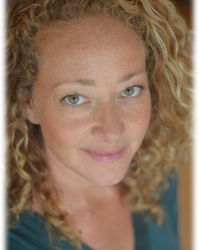06.18.2019
Interview with 2019 Summer Prize Judge Ramona Ausubel
Interview with 2019 Summer Prize Judge
Ramona Ausubel
 In honor of our inaugural 2019 Summer Prizes in Fiction & Poetry, Fiction Editor Molly Gutman conducted a micro-interview with our Fiction Prize Judge, Ramona Ausubel. Read on to learn more about fabulist worlds, Ramona Ausubel’s newest short story collection Awayland, and what she’s looking for in a winning story!
In honor of our inaugural 2019 Summer Prizes in Fiction & Poetry, Fiction Editor Molly Gutman conducted a micro-interview with our Fiction Prize Judge, Ramona Ausubel. Read on to learn more about fabulist worlds, Ramona Ausubel’s newest short story collection Awayland, and what she’s looking for in a winning story!
Ramona Ausubel is the author of two novels and two story collections. Her most recent book, Awayland, was a New York Times Editors’ Choice selection, a Finalist for the California Book Award, Colorado Book Award and long-listed for the Story Prize. She is also the author of Sons and Daughters of Ease and Plenty, No One is Here Except All of Us and A Guide to Being Born. She is the recipient of the PEN/USA Fiction Award, the Cabell First Novelist Award and was a finalist for the New York Public Library Young Lions Award. She teaches in the low-residency MFA program at the Institute of American Indian Arts and joins the faculty at Colorado State University in the fall of 2019.
Molly Gutman is a fiction editor at Cream City Review and a PhD student in fiction at the University of Wisconsin, Milwaukee. Her stories appear or are forthcoming in Granta, Alaska Quarterly Review, Black Warrior Review, and elsewhere.
*
1. Lots of your stories exist in fabulist worlds, where people grow extra arms to represent their love, or where a Cyclops might write a dating profile. But even your more realist stories still feel slippery—weird, magical—in the way they deal with memory and love and the human body. What does fantastical fiction offer us that other approaches to fiction might not?
I think the world is profoundly strange and surprising—the actual, real world. And human experience is an entire universe of strange and surprising, so to add a fantastical element sometimes seems like a way of holding a mirror up to regular life, regular experience and saying, “See that? Isn’t that that incredible and weird?” I always want to write toward experiences that feel true and sometimes a magical twist makes it easier to see the thing. Sometimes it’s not needed and the world’s own wildness speaks for itself.
2. What about experimental and citational narrative forms? You have stories that are (or quote from) dating profiles, acknowledgements and museum placards, fictional books, letters, and more. How do you think through these approaches? Do choices in framing and presentation come early in your drafting process?
Some of these come from things I’ve seen or read that struck me as very odd. I was in the Egypt Museum in Cairo where there really is a room full of animal mummies and it really does have a plaque listing the people the animal mummies would like to thank. I saw that and thought, “Oh, DO they?” And that became a story. Same with the dating profile. I knew I needed the chatty voice of internet advice to off-set the Cyclops’ own story. Sometimes these documents feel like a map I’m laying down to give us somewhere to stand while a large or peculiar situation takes place. It’s grounding. I’m also always thinking of how to set different elements in opposition to one another. A mundane real-world document with an otherworldly character, etc.
3. Some of your newest collection, Awayland, taps into preexisting narratives like Greek Mythology. I love retellings (they’re probably my favorite genre!) and I’m hoping you’ll talk a little about what in retellings excites you.
I love them too! There’s something about those stories that so many of us carry around, a sort of collective narrative burden/delight. They are often meant to be teaching stories too, or alternative histories, or justifications for wars or political borders. Those stories do tremendous work in our human world and it’s just really a joy to grab a thread and pull it into a new piece of fabric. It feels like invoking something big.
4. Who are you reading right now?
I am telling everyone I talk to about Helen Phillips’ new novel THE NEED. It’s creepy and gripping and profound. I have been reading Pam Houston’s beautiful memoir DEEP CREEK, Mira Jacob’s graphic memoir GOOD TALK and re-reading Louise Erdrich.
5. When you’re reading stories—or judging prizes—what blows your socks off? What are you looking for in a winning entry?
I’m always reading for ambition and bravery, even if it’s a short story. Something reached for (even if it doesn’t come out perfectly)—beautiful language, a big idea, some kind of what-if. Most importantly, I love it when I can feel how strongly a writer cared about getting this thing down. Whether the story is funny or sad or everything at once, I want to feel like it had to be here.
*
Submissions to our 2019 Summer Prizes in Fiction and Poetry are open until August 1st. Click here for full guidelines.